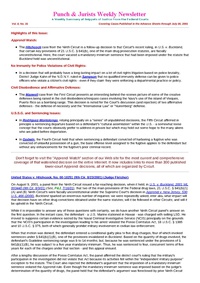Loaded on
July 1, 2001
published in Punch and Jurists
July 30, 2001
QUOTE OF THE WEEK - “The Government is best which governs least.”
In the middle of the 19th Century, philosopher and author Henry David Thoreau wrote the model for social protest in his classic essay “Civil Disobedience” - a work that was originally titled “Resistence to Civil Government.” Starting …
Loaded on
July 1, 2001
published in Punch and Jurists
July 30, 2001
On August 9, 2001, a panel from the Ninth Circuit issued a far reaching decision, when it held, in U.S. v. Buckland, 2001 WL 893440 (9th Cir. 8/9/01) (See, P&J, 7/16/01), that two of the main provisions of the Federal drug laws, 21 U.S.C. § 841(b)(1)(A) and (B) Ninth …
Loaded on
July 1, 2001
published in Punch and Jurists
July 30, 2001
In this case, Judge Kahn held that police officers who violate a person’s civil rights are not immune from damages and are not entitled to assert a defense of qualified immunity in a lawsuit charging them with civil rights violations - even if the policemen claim that they were …
Loaded on
July 1, 2001
published in Punch and Jurists
July 30, 2001
If a person is convicted for being an accessory-after-the-fact, he is sentenced under the provisions of U.S.S.G. § 2X3.1, which provides that his base offense level shall be “6 levels lower than the offense level for the underlying offense, but in no event less than 4, or more than …
Loaded on
July 1, 2001
published in Punch and Jurists
July 30, 2001
The defendant in this case argued that the district court had erred in sentencing him to 108 months in prison in the absence of a jury finding as to the quantity of cocaine he attempted to possess. Relying on the Supreme Court's decision in Apprendi v. New Jersey, 530 …
Loaded on
July 1, 2001
published in Punch and Jurists
July 30, 2001
This decision marks the second time that an appellate court has approved - at least in principle - the concept that a district court may grant a sentencing departure based on a person’s “cultural assimilation” - but we still don’t really know what that means. Taken by themselves, the …
Loaded on
July 1, 2001
published in Punch and Jurists
July 30, 2001
This decision deals with the ongoing protests in Puerto Rico over the Navy’s use of a military installation on the island of Vieques as a site for live-fire artillery and bombing exercises. What makes the decision both novel and interesting is its discussion of two affirmative defenses that the …
